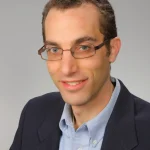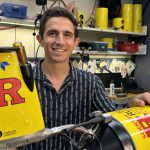A climate scientist, a playwright and an artist have been named Guggenheim fellows for their work in fields of creative arts and environmental sciences.
The three professors from Rutgers University-New Brunswick were among 188 fellows selected this year from a pool of 3,000 across 52 disciplines, according to the John Simon Guggenheim Memorial Foundation, which made the announcement. They went through “a rigorous application and peer review process,” the foundation officials said, and will receive grants to pursue their proposed projects.
Since its inception in 1925, the Guggenheim fellowships have been awarded to artists and scholars in all fields to develop their craft “under the freest of conditions.” Some of the fellowships were funded through gifts including from the Climate Change Fund, which was created by 1989 Guggenheim fellow Jerold S. Kayden in support of climate-related work. This year, the fund will help support Robert Kopp’s upcoming project on sea-level change and climate adaptation.
In 99 years, about $400 million have been granted. Previous notable fellows include Zora Neale Hurston, who wrote Their Eyes Were Watching God with her Guggenheim grant, and photographer Robert Frank who produced his book The Americans with the fellowship. This year’s fellows also includes novelist Emma Straub and Tracy K. Smith, a former U.S. Poet Laureate.
“By earning the Guggenheim Fellowship, these outstanding faculty members strengthen our Rutgers-New Brunswick community by giving students access to new horizons in scholarship and the creation of new knowledge,” Rutgers University–New Brunswick Chancellor Francine Conway said. “Their accomplishment uplifts us collectively and proves that we truly are stronger together.”
Robert Kopp

Distinguished Professor
Department of Earth and Planetary Sciences
School of Arts and Sciences
Field of Geography and Environmental Studies
Climate scientist Robert Kopp grew up in a family where public service was central.
His mother, Nancy Kopp, was a politician who served the state of Maryland for decades, first in the state legislature and then as State Treasurer. His father, Robert Kopp, was a longtime federal attorney at the Department of Justice.
Kopp has upheld that family tradition. A Distinguished Professor in the Department of Earth and Planetary Sciences, he has combined his expertise as a climate scientist and climate policy scholar to address sea-level rise and global climate change. He is a lead author of the United Nations’ Intergovernmental Panel on Climate Change’s 2021 Sixth Assessment Report and of the U.S. Global Change Research Program’s 2017 Fourth National Climate Assessment.
His message is clear.
“Climate change is real, it’s caused by humans, it’s happening now and it’s starting to have fairly significant impacts we can identify and measure,” he said.
He has loved science since he was a boy. The posters on the walls of his childhood bedroom included photos of astronauts, charts of the geological time scale and of cloud types and a large world map.
“I think if you looked at me when I was 10, you probably would not be that surprised about where I’ve ended up,” Kopp said.
His undergraduate thesis at the University of Chicago focused on meteorites from Mars. He earned his doctoral degree from the California Institute of Technology, where part of his thesis work was on the idea of “snowball Earth” – the theory that the planet has been encased in ice from pole to equator multiple times.
Kopp served as a postdoctoral associate in geoscience and public affairs at Princeton University. As a science and technology policy fellow at the U.S. Department of Energy, he worked during the early Obama administration on international clean energy diplomacy and on incorporating climate change impacts into U.S. regulatory policy.
Since he joined Rutgers in 2011, he has taken on major roles combining climate science with policy. Kopp is the director of the Megalopolitan Coastal Transformation Hub (MACH), a 13-institution National Science Foundation-funded consortium that studies how changing coastal hazards, human decisions, policy and markets shape climate risks in complex, urbanized coastal regions like the U.S. mid-Atlantic.
Kopp is also a director of the Climate Impact Lab, a multi-institutional collaboration, focused on measuring and projecting the impacts of climate change on the economy. He was also one of the founding codirectors of Rutgers’ Office of Climate Action.
The Guggenheim Fellowship will enable him to write a book about climate change that will explore how to make decisions despite the uncertainties that are ahead.
“There are big unknowns about the future, and yet we still have to make decisions today that affect not only how much the climate will change but also how we and our children will live – and, hopefully, thrive – in that uncertain future.”
–Kitta MacPherson
Read the full article on Rutgers Today. This article was published by Rutgers Today on April 30, 2024.








